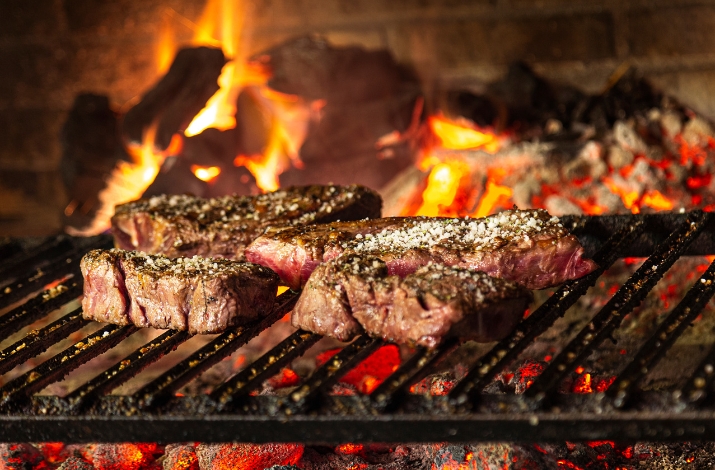Fueling Your Body with Meat: The Science Behind the Carnivore Diet

If you’ve eaten low carb or keto for long, chances are you’ve come across the carnivore diet, an extreme form of the ketogenic diet. Like the name suggests, a carnivore diet is limited to animal products. The scientific community hasn’t given it much attention, with few studies addressing the diet and no long-term studies on efficacy or outcomes. Given that the diet is a version of keto, however, studies do exist showing the benefits of such carb restriction [1].
While the carnivore diet may seem like a new fad, its roots are ancient, leading back to our earliest ancestors. The reason for the diet’s newfound popularity, however, is the number of people who swear that it’s a veritable panacea, reducing symptoms of everything from acne to mood disorders and even chronic diseases.
There are a number of reasons people may start eating carnivore, and within the diet itself, there is room for variation. Let’s first examine some of the reasons people choose this way of eating:
Carnivore as an Elimination Diet
An elimination or exclusion diet is a way of eating designed to help a person determine what foods trigger sensitivities, allergies, or flare-ups. When undergoing an elimination diet, there are two prevailing methods. One is to start eliminating the most common triggers, see how the body responds for one to two months, and then eliminate or reintroduce foods based on the body’s response. The other method, and the one utilized in a carnivore diet, is to eliminate virtually all potential triggers. An individual will remove all foods except meat and typically salt from their diet and will drink only water.
Although it sounds extreme, many find success eating carnivore as an elimination diet because, when compared to other elimination diets, it’s simple, clear, easy to understand, and easy to prepare. The diet is also known to reduce cravings that can make elimination diets so hard to sustain [2]. The restriction allows practitioners’ bodies to heal fully from the effects of their allergies or sensitivities before determining whether or not they want to reintroduce foods.
Carnivore for Weight Loss
As an extreme form of keto, eating a carnivore diet works along the same lines as any other ketogenic diet: by restricting carbs, you manage your insulin, and your body goes into ketosis, burning its own stored fat for fuel. Unlike a traditional keto diet, however, a general carnivore diet isn’t concerned with what proportion of their diet comes from fat versus protein (carbohydrates are negligible on most carnivore diets). Those looking to lose weight eating carnivore should pay attention to the same potential pitfalls in any ketogenic diet, including the keto flu. Simply increasing water intake and salting meat can help stave off many of the negative effects while letting the body transition to the new way of eating. One can expect weight loss to mirror that of a strict ketogenic diet.
Carnivore for Health
Our food has changed in the last century, and not for the better. As the Bionutrient Food Association reports, “Over the last 50 years, the amounts of protein, calcium, phosphorus, iron, riboflavin and vitamin C in conventionally grown fresh fruits and vegetables have declined significantly”, while modern wheat varieties have half the protein they once did [3]. Plant-based diets are often starved of nutrients [4]. On the other hand, meat, organ meat, fish, and seafood are nutrient dense. Animal proteins contain all nine essential amino acids that are crucial for nutrient absorption, tissue repair, and protein synthesis [5].
Many who eat a carnivore diet have adopted it for general health. They see the harm the modern Western diet has done and want to connect with the more natural, nutrient-rich way of eating that our early ancestors followed. In one study, those who eat carnivore “reported improvements in chronic medical conditions, general health, and aspects of well-being such as energy, sleep, strength, endurance, mental clarity, memory, and focus”[6].
With these different motivations in mind, let’s take a look at some of the variations found in the carnivore diet.
Strict Carnivore
This is as straightforward as it sounds: eat only meat, and drink only water. Some strict practitioners may also include salt [7]. While this level of rigidity is rarely sustainable for people in the long term, as an elimination diet, it’s no doubt effective. Eating strict is also common for people just starting out or trying to “get back on the wagon” when they’ve slipped or introduced foods back into their diets that are leading to poor outcomes. After a month, people commonly move to a more flexible diet, although some may stay strict indefinitely.
Standard Carnivore
Much more common in the carnivore world is a diet that embraces a range of animal products, including organ meat, eggs, full-fat dairy, whey, and bone broth. A small subset of practitioners may even allow for raw, unpasteurized honey, although this is a highly debated topic in the carnivore community and will depend on someone’s philosophy and motivations for following this way of eating [8]. Those eating honey and full-fat dairy are sometimes considered “animal-based” rather than “carnivore.”
Ketovore
A ketovore diet focuses on staying in nutritional ketosis. Most people eating any carnivore diet will be in ketosis unless they consume much dairy or honey. But someone eating ketovore will likely pay more attention to the breakdown of their macronutrients and will allow for some wiggle room as they focus their diet on animal-based products. Someone eating ketovore may occasionally add in fruit, veggies, or even small amounts of dark chocolate for dessert as they enjoy the added flexibility of combining the two diets. Staying in ketosis by eating a predominantly animal-based diet is key for success as a ketovore. Those who add in the occasional non-animal-based food but whose macros do not keep them in ketosis are often called carnivore-adjacent.
As you can see, there are plenty of reasons people may choose to eat a carnivore diet, and there’s enough variation to allow people to experiment with what gives them the best outcomes. Less important than a label is what the diet does for you and how it makes you feel. If you’re interested in trying a carnivore diet, your motivations and your individual needs will best help you determine the way of eating that’s right for you.
References
- Paoli A, Rubini A, Volek JS, Grimaldi KA. Beyond weight loss: a review of the therapeutic uses of very-low-carbohydrate (ketogenic) diets [published correction appears in Eur J Clin Nutr. 2014 May;68(5):641]. Eur J Clin Nutr. 2013;67(8):789‐796. doi:10.1038/ejcn.2013.116
- Anguah KO, Syed-Abdul MM, Hu Q, Jacome-Sosa M, Heimowitz C, Cox V, Parks EJ. Changes in Food Cravings and Eating Behavior after a Dietary Carbohydrate Restriction Intervention Trial. Nutrients. 2019 Dec 24;12(1):52. doi: 10.3390/nu12010052. PMID: 31878131; PMCID: PMC7019570.
- https://bionutrient.net/site/news/declining-nutrient-value-food
- https://theconversation.com/vegan-diets-are-adding-to-malnutrition-in-wealthy-countries-107555
- https://www.healthline.com/nutrition/essential-amino-acids
- https://academic.oup.com/cdn/article/5/12/nzab133/6415894
- https://carnivorebar.com/blogs/carnivore-bar-blog/carnivores-and-salt
- https://carnivorebar.com/blogs/carnivore-bar-blog/is-honey-carnivore
This article is for informational and educational purposes only. It is not, nor is it intended to be substitute for professional medical advice, diagnosis, or treatment and should never be relied upon for specific medical advice.

















